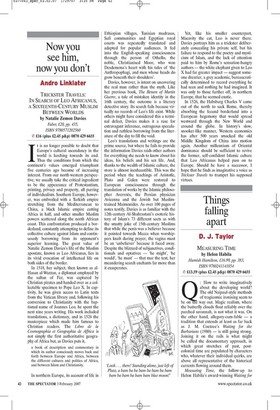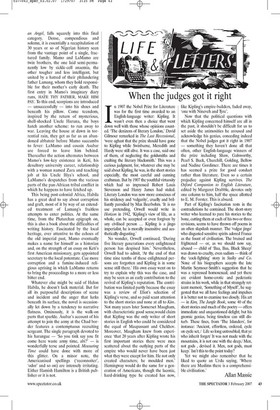Things falling apart
D. J. Taylor MEASURING TIME by Helon Habila Hamish Hamilton, £16.99, pp. 383, ISBN 9780241141854 © £13.59 (plus £2.45 p&p) 0870 429 6655 : How to write imaginatively about the developing world? The old Naipaul-style methods of tragicomic ironising seem to be onTfle way out. Magic realism, where the butterfly clouds float reliably over the parched savannah, is not what it was. On the other hand, allegory-cum-fable — a tradition that extends at least as far back as J. M. Coetzee's Waiting for the Barbarians (1980) — is still going strong. Joining it on the rails is what might be called the documentary approach, in which great stretches of past, postcolonial time are populated by characters who, whatever their individual quirks, are above all representative of the historical currents flowing around them.
Measuring Time, the follow-up to Helon Habila's award-winning Waiting for an Angel, falls squarely into this final category. Dense, compendious and solemn, it is essentially a recapitulation of 30 years or so of Nigerian history seen from the vantage point of a single, fractured family. Mamo and LaMamo are twin brothers, the one laid semi-permanently low by sickle-cell anaemia, the other tougher and less intelligent, but united by a hatred of their philandering father Lamang, whom they hold responsible for their mother's early death. The first entry in Mamo's imaginary diary runs, HATE THY FATHER, MAKE HIM PAY. To this end, scorpions are introduced — unsuccessfully — into his shoes and beneath his pillow. Come teendom, inspired by the return of mysterious, shell-shocked Uncle Haruna, the boys hatch another scheme: to run away to war. Leaving the house at dawn in torrential rain, they get as far as an abandoned abbatoir before Mamo succumbs to fever: LaMamo and cousin Asabar are forced to leave him behind. Thereafter the action alternates between Mamo's low-key existence in Keti, his desultory university career, relationship with a woman named Zara and teaching job at his Uncle Iliya's school, and LaMamo's despatches from the various parts of the pan-African tribal conflict in which he happens to have fetched up.
This being post-colonial Africa, Habila has a great deal to say about corruption and graft, most of it by way of an extended treatment of Lamang's fruitless attempts to enter politics. At the same time, from the Plutarchan epigraph on, this is also a book about the difficulties of writing history. Fascinated by the local heritage, ever attentive to the echoes of the old imperial past, Mamo eventually makes a name for himself as a historian and, on the strength of an essay on Keti's first American missionary, gets appointed secretary to the local potentate. Cue more corruption and a famine-induced religious uprising in which LaMamo returns to bring the proceedings to a more or less bitter end.
Whatever else might be said of Helon Habila, he doesn't lack material. But for all its purposeful descriptions of scene and incident and the anger that lurks beneath its surface, the novel is occasionally let down by a tendency to narrative flatness. Ominously, it is the walk-on parts that sparkle. Asabar's account of his attempt to join the army at the Chad border features a contemptuous recruiting sergeant. The single paragraph devoted to his harangue — 'So you tink say you fit come here waste army time, abi?' — is wonderfully terse and pointed. Measuring Time could have done with more of this glitter. On a minor note, the Americanised spellings (reconnoiter', 'odor' and so on) are intensely irritating. Either Hamish Hamilton is a British publisher or it is not.





















































 Previous page
Previous page